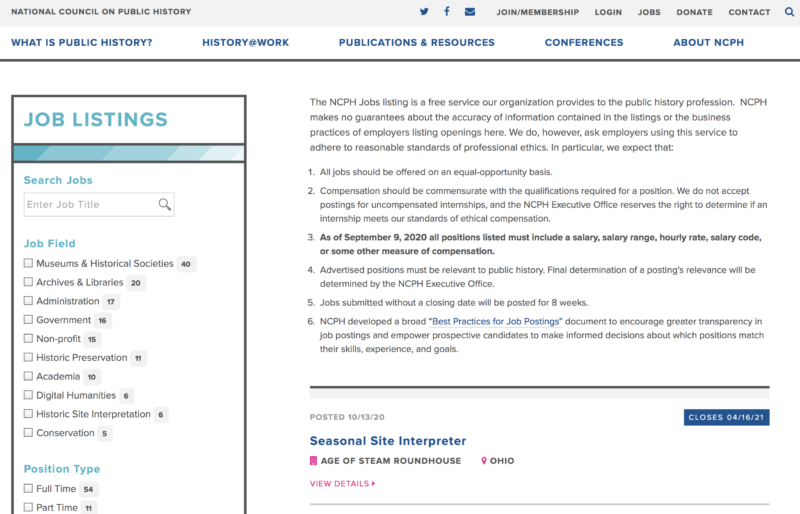Why NCPH will only post jobs with compensation information
03 November 2020 – Hannah Jane Smith and Suzanne Fischer
Editors’ Note: As of September 9, 2020, all positions listed on the NCPH jobs page must include a salary, salary range, hourly rate, salary code, or some other measure of compensation. In this essay, NCPH graduate assistant Hannah Jane Smith and board member Suzanne Fischer cover some of the reasons why the Board made this change.
Hannah Jane Smith: Why including salary listings make job searching more relevant
When I first started working on National Council on Public History’s (NCPH) jobs page, only a few weeks into my position as NCPH’s graduate assistant, I was amazed by the sheer variety of jobs available to public historians. NCPH posted compensated, full- and part-time jobs searchable by location, field, and position type. Yet the more positions I saw that did not offer even a hint as to what kind of compensation I could potentially receive, the more discouraged I became with the job market, which is tightening due to the COVID-19 pandemic. In this post, NCPH board member Suzanne Fischer and I will provide two takes on why NCPH is now following the overwhelming consensus of our peers in the field and committing to posting only job announcements that include salary information.

NCPH job listings page. Screenshot credit: Nicole Belolan
I believe it’s a common misconception that students entering the work force will or should simply go where the jobs are, which people often encourage us to do. I worked hard to learn and grow in this field, so I want a job that is right and in a place that is fitting for me. It narrows my options immensely when prospective employers do not provide an anticipated salary or salary range for a given job. It would be very difficult for me to apply for a job without knowing the benefits, either. Public historians are not ultra-altruistic people who will do the work for under a livable wage just because they enjoy what they do. I like what I do. I like my field. And because of that, I want to know that I will, in turn, be appropriately compensated for my work.
As for my perspective as NCPH’s graduate assistant who adds posts to the NCPH jobs page, I think requiring jobs listed here to provide salary information is a step in the right direction for NCPH. Assuming most students and job seekers think as I do with regard to wanting to see a salary or salary range, the page will be even more usable and beneficial. It is ethical to list a salary for plenty of reasons but, most important to me, it is ethical because doing so offers more transparency to potential employees, and it saves time for both applicants and hiring officers. Neither side wants to waste time going through the application and interview process only to find the candidate is not a good fit for the job because of the salary. By only posting jobs with salary listings, the NCPH jobs page will be a place where people can feel confident in job searching. For other examples of organizations that require compensation information on their job boards, see the Association of Midwest Museums and the American Association for State and Local History.
Suzanne Fischer: Why posting salary ranges improves the search process
As an NCPH Board member and chair of the NCPH Advocacy Committee, I’ve been proud of NCPH’s efforts to model more equitable practices for the field as they relate to hiring. See, for instance, our 2008 internship best practices, our rationale for not posting uncompensated internships, and our best practices for job postings. So I’m delighted that we’re building on existing work and implementing this new policy for the NCPH jobs page. Posting salary ranges makes public history job searching more transparent and fair. How you’re paid should not depend solely on your proficiency in salary negotiation: that is clearly discriminatory, as nonprofit blogger Vu Le demonstrates.
As a hiring manager, I want to find great people for open positions at my museum and I want to compensate them fairly. Treating job candidates well throughout the search process shows them that we are an organization that treats employees well. Posting a salary range with the job ad is part of that process. Luckily, I’m part of a government organization that posts salary ranges by statute. Setting shared expectations in all public history settings will help make any projects a new employee works on successful, and it’s the same with a posted salary range.
Low compensation for public history jobs is a very real problem, but clearly seeing the salaries being offered for jobs will help us begin to tackle it as a field.
~Hannah Jane Smith is the graduate assistant for NCPH and a Public History MA student at Indiana University-Purdue University, Indianapolis.
~Suzanne Fischer is the museum director of the Michigan History Center and a member of the NCPH Board.



